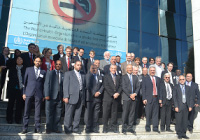 Novel coronavirus belongs to the same family of coronaviruses that caused the SARS epidemic in 2003A technical consultative meeting on novel coronavirus infection was held at the WHO Regional Office from 14 to 15 January 2013, organized by WHO pandemic and epidemic disease programme. The objectives of the meeting were to:
Novel coronavirus belongs to the same family of coronaviruses that caused the SARS epidemic in 2003A technical consultative meeting on novel coronavirus infection was held at the WHO Regional Office from 14 to 15 January 2013, organized by WHO pandemic and epidemic disease programme. The objectives of the meeting were to:
- obtain the most up-to-date scientific and public health understanding of the novel coronavirus based on available information;
- identify critical knowledge gaps in understanding the current risk;
- identify additional steps needed to improve the knowledge and narrow the research gap.
The meeting also provided an update on the current situation in order to increase global awareness and reach consensus on measures to be taken to improve public health preparedness. It was attended by participants from Jordan, Saudi Arabia and Qatar, as well as WHO staff and representatives of WHO collaborating centres, international research and public health agencies working with WHO in the global response to novel human coronavirus infections which emerged in September 2012.
The novel coronavirus first raised concerns in September 2012 when it was found to cause severe respiratory disease in two patients from the Region, one from Qatar and one from Saudi Arabia. The subsequent discovery of two clusters of cases, one in a family in Saudi Arabia and the second in a group of health care workers in Jordan, increased the urgency for better understanding of the source and transmissibility of this new virus as the discovery of this new virus brought back memories of the SARS epidemic in 2003, as this virus belongs to the same family of coronaviruses that caused the SARS epidemic in 2003.
The potential of the virus to have widespread serious consequences is thought to be significant, yet current knowledge of its epidemiology and the natural history of infection with this agent is limited. Many critical questions about the source of the virus, its potential for transmission, routes of exposure and the clinical presentation of disease caused by this novel virus remain unanswered. The evidence that has been accumulated so far remains inconclusive about the origin and transmissibility of this virus. Thus far, WHO has received reports of 17 cases of human infection with novel coronavirus, 11 of whom have died. All the reported cases were severely ill.
The meeting concluded with a set of actions and recommendations which include further epidemiological and serological studies among close contacts of cases and in general populations as well as revising WHO's interim surveillance guidelines based on currently available information in order to better understand the current extent and geographic spread of infections among general populations, as well as the severity and transmission risk of the virus. The meeting brought together national experts who have been involved in investigations around the cases that have occurred, scientists who have been involved with the study of the origin of the virus, and experts who participated in the global public health response to this infection as well as to SARS and avian influenza in the past. As such, the rich deliberations and discussions that took place during the meeting contributed significantly to the positive outcome of the meeting. This will, in turn, strengthen the global and regional response efforts to reduce public health threats from this novel infection.
Related link
Read more on MERS-CoV in the Eastern Mediterranean Region
Read more on novel coronavirus infection in the Eastern Mediterranean Region [pdf 178kb]


